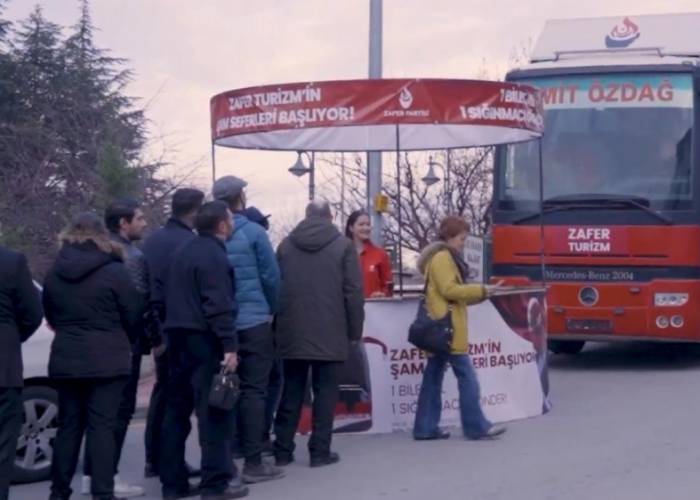Murat Erdogan, the head of the IGAM Academy of the Asylum and Migration Research Center – İGAM in Turkey, emphasizes that societal concerns regarding irregular migration are often based on incorrect or incomplete information. Failing to address these concerns seriously can give rise to populist and racist discourses, transforming fear into hatred. This situation has contributed to a low sense of security among Syrians and has driven 60% of them to aspire to migrate to Europe. Erdogan warns that the emergence of Syrian nationalism as a response to racism and hatred further perpetuates a closed circle of fear, anxiety, and threats to civil peace within Syrian and Turkish societies.
The Turkish expert believes that, globally, migrants are often viewed as contributors to development, but irregular migration is seen as a threat. “Wealthy countries tend to differentiate between migrants and refugees. Migrants are selectively chosen based on specific criteria, such as language proficiency, professional skills, age, health, and criminal records. In contrast, refugees can unexpectedly arrive at your doorstep, making their management much more challenging.”
American Forces Blew up a SDF Tunnel in Hassakeh at the Request of Turkey
The expert on asylum and migration issues cautions that if societal anxieties are not taken seriously if convincing information is not provided, and if appropriate measures are not implemented, the prevalent panic in society will provide fertile ground for the emergence of populist and racist politicians.
“Turkey has been hosting millions of refugees for over 12 years, and the real challenge lies in managing this process and facilitating the successful integration of Syrians and other refugees into Turkish society.”
Research indicates that 90% of Turkish society believes that Syrians will continue to reside in Turkey, but 88.5% express a desire for Syrians to leave. Officials responsible for addressing these concerns should take them seriously. Emotional appeals such as claiming brotherhood alone cannot effectively manage the process.
Following Eid al-Adha, the Turkish Ministry of Interior initiated an extensive security campaign to apprehend Syrians who are considered “violators.” Turkish laws prohibit individuals under “temporary protection” from leaving the state in which they obtained their temporary protection card (Kimlik). However, the availability of job opportunities in other states, particularly Istanbul, tempts many Syrians to violate this law and relocate to places where they can find work to cope with the country’s longstanding economic crisis, as the majority of them earn minimum wages.
The political environment and the rhetoric directed toward Syrians have reached such a harsh level that we fail to recognize the risks associated with it. Syrians are gradually losing their gratitude towards Turkish society, and anger is growing, potentially giving rise to a new wave of Syrian nationalism, which, in turn, may fuel further racism within Turkish society.
“We cannot overlook the possibility that this situation poses a potential threat to Turkey’s future peace. Therefore, it is imperative to address and resolve this potential problem seriously. We need to understand the social and historical factors contributing to maladaptation and work on implementing effective integration policies.”
The Turkish Government’s Mistake
Two years ago, the head of the Asylum and Migration Research Center (İGAM), Mr. Metin Çorbater, who previously served as the spokesperson for the UNHCR in Turkey and is one of the leading advocates for Syrian rights in Turkey, was interviewed by Syria TV.
Çorbater believes that the Turkish government’s policies towards Syrian displacement to Turkey were a mistake, providing an opportunity for the opposition to exploit the issue for political gain. According to him, the government primarily handled the matter locally, neglecting the role of the UNHCR. The government’s belief that it was best suited to handle the situation led to minimal coordination with the UNHCR.
The absence of what Çorbater described as a “neutral international arbiter” overseeing the Syrian refugee issuee in Turkey allowed the opposition to exploit the presence of Syrians as a new focal point for societal polarization. Syrians were labeled as “Erdogan’s refugees” at times and “Islamic extremists” at others.
Turkey has been providing generous education and healthcare services to Syrians falling under the “temporary protection” category, according to Çorabater. However, the Turkish government should “have the courage to recognize Syrians as refugees” since this status would guarantee their rights to these services as entitlements rather than mere acts of goodwill. It would also grant them rights such as freedom of movement within the country, the ability to travel abroad, and property ownership. Recognizing their refugee status would further facilitate effective integration policies with the host community.
“Instead of exacerbating the situation, the Turkish opposition, which claims to champion social democracy, should have recommended that the government grant Syrian refugees their international status,” said Çorbater, criticizing the opposition’s tendency to add fuel to the fire.
This article was translated and edited by The Syrian Observer. The Syrian Observer has not verified the content of this story. Responsibility for the information and views set out in this article lies entirely with the author.


